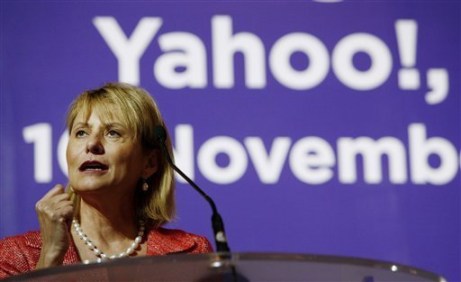 Carol Bartz spent much of her first year as Yahoo Inc.’s chief executive rallying the troops and clearing the decks, often sounding like a salty drill sergeant as she vowed to whip the downtrodden Internet company back into shape. For all the tough talk, Yahoo remains on shaky ground as Bartz marks her one-year anniversary as CEO on Wednesday.
Carol Bartz spent much of her first year as Yahoo Inc.’s chief executive rallying the troops and clearing the decks, often sounding like a salty drill sergeant as she vowed to whip the downtrodden Internet company back into shape. For all the tough talk, Yahoo remains on shaky ground as Bartz marks her one-year anniversary as CEO on Wednesday.
Revenue has sagged even further since her hiring while Yahoo’s share of the Internet lucrative search market has shriveled and the company’s stock performance has lagged its most prominent peers.
“Operationally, I don’t think you can point to any meaningful success yet, although you can point to some good strategic moves,” said Benchmark Co. analyst Clayton Moran.
Yahoo declined a request to interview Bartz. Bartz’s most notable accomplishment so far has been negotiating an Internet search partnership with rival Microsoft Corp., resolving a tense courtship that began under her predecessors. Moran and other analysts have higher hopes for Bartz in her second year at the helm, largely because they believe a recovering economy will help Yahoo sell more online advertising and bounce back from its sharpest annual revenue decline in eight years.
Yahoo’s fourth-quarter results aren’t due out until Jan. 26, but management has projected an 11 percent drop in its 2009 revenue.
Convinced the worst is over, Standard & Poor’s equity analyst Scott Kessler rates Yahoo as his top Internet stock pick for this year, even though he says Yahoo’s financial results so far under Bartz have been “consistently disappointing.”
Bartz, 61, can’t be entirely blamed for the letdown because Yahoo’s profits depend on advertising, a business that suffered as marketers curtailed their spending during the worst U.S. recession in 70 years.
Yahoo’s financial funk began in 2006 while Terry Semel was still CEO and deepened even further when company co-founder Jerry Yang took over the top job in June 2007. Analysts say Yahoo became bloated and distracted in recent years while more nimble rivals such as Google and Facebook became more popular.
The missteps crimped Yahoo’s operating profit margin, which is now hovering around 6 percent — a level that Bartz has publicly ridiculed as “pathetic.” She has promised to produce an operating profit margin ranging from 15 percent to 20 percent by 2012.
Bartz’s ambitions are hitched to her plan to rely on Microsoft’s Internet search technology in a 10-year deal regulators are expected to approve early this year. As Bartz envisions, Yahoo would prosper by trimming its Internet search expenses while retaining most of the revenue from the ads shown alongside the search results on its Web site.
But Yahoo risks appearing to have given up on Internet search, which could cause more people to look up information elsewhere, including Microsoft’s Web sites. In that scenario, Yahoo wouldn’t get a cut of the search ad revenue and could lose valuable insights into Web surfers’ preferences.
Yahoo’s share of the U.S. Internet search market has already fallen by nearly four percentage points to about 17.5 percent during Bartz’s tenure, as both Google and Microsoft gained about two percentage points apiece during that period, according to the Internet research firm comScore Inc.
At least Bartz got a Microsoft deal done. That’s something that eluded Yang, who turned down an opportunity to sell Microsoft in its entirety for $47.5 billion in May 2008 to the outrage of many shareholders. He and the rest of Yahoo’s board later refused to join Microsoft in a search partnership and tried to team up with Google Inc. instead, only to be blocked by regulators.
When Yang surrendered the reins to Bartz, Yahoo’s stock price stood at $12.10 — far below Microsoft’s final takeover offer of $33 a share.
Yahoo shares gained 38 percent during Bartz’s first year, but that’s less than the 48 percent increase seen in the technology-laden Nasdaq composite index. And Microsoft’s stock has risen by more than 50 percent while Google’s shares have surged by nearly 90 percent.
Bartz still has ample time to turn around Yahoo because she still has three years left on a contract that pays her a $1 million annual salary with potential bonuses of $4 million annually. Her biggest payoff could come from 5 million stock options that she received last January with an exercise price of $11.73 apiece.
None of the options have vested so far because Bartz hasn’t hit the targets set by the company’s board. Yahoo’s closing stock price must be at least $17.60 for 20 consecutive trading days for the first 1.67 million of Bartz’s options to vest. The stock finished above that price on just three days during her first year on the job. Yahoo shares fell 6 cents to close Tuesday at $16.68.
The remainder of Bartz’s stock options vest at even higher prices. She can exercise the last batch of 833,334 options if Yahoo’s stock consistently closes at a minimum of $35.19 — topping Microsoft’s last takeover offer.


